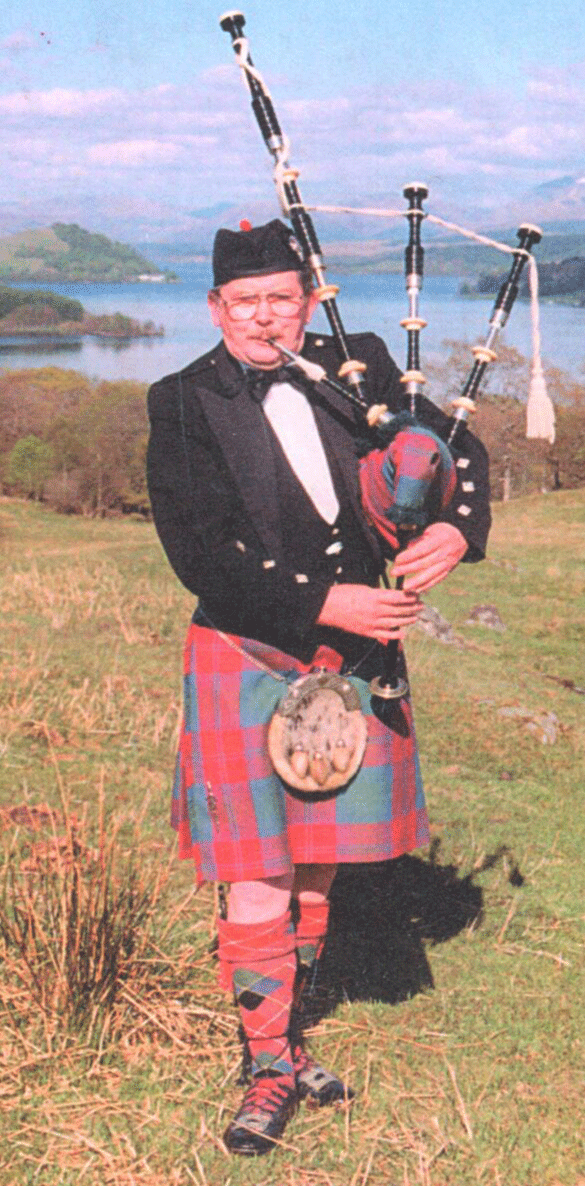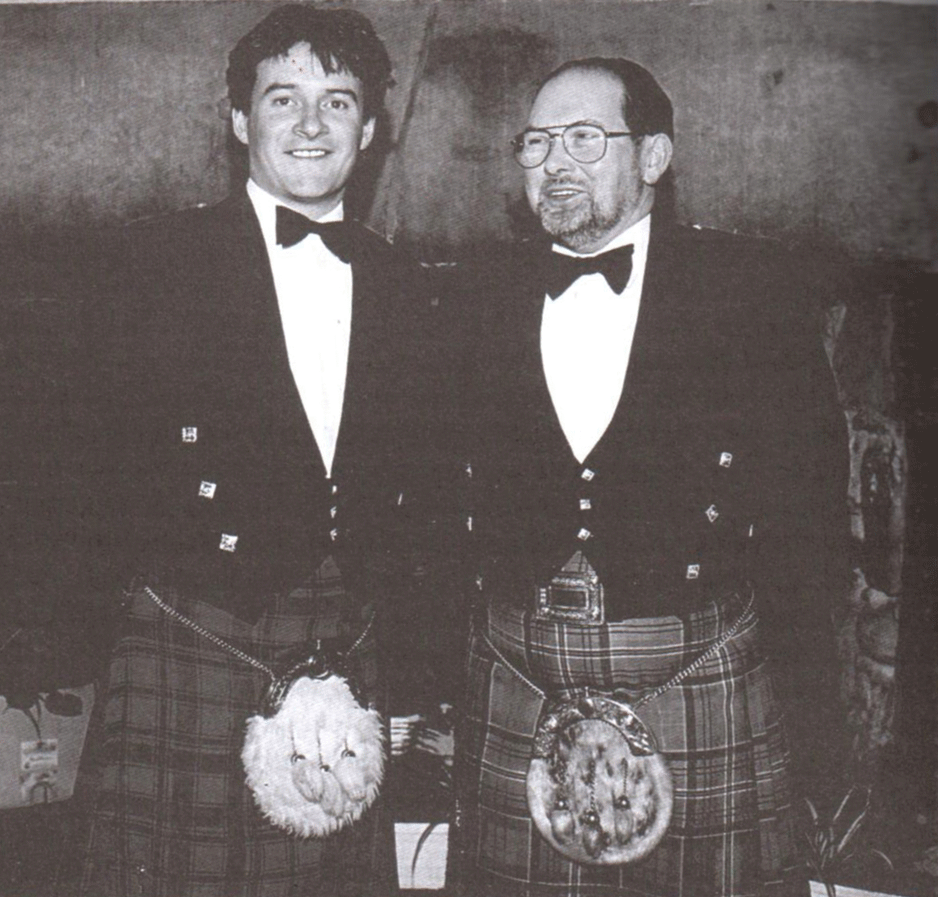Arthur Gillies
(1934-2003)
Reprinted with permission from Piping Traditions of Argyll, by the late Bridget MacKenzie, published 2004 by the College of Piping.

Iain MacInnes wrote an introduction to Volume III of the 1997 Recital Series of the Piping Centre in Glasgow, which gives us a flavor of Arthur Gillies:
‘Arthur Gillies from Kilchrenan in Argyll has established a formidable reputation as one of our foremost exponents of Piobaireachd. As a young man he had tuition from the Lawrie family in Oban, and later from ‘big’ Donald MacLean of Lewis. At the age of seventeen he won his first professional contest, and since then he has been a familiar and highly regarded figure on the piping circuit. Indeed he has the rare distinction of having won every prize at the Argyllshire Gathering in Oban, from the local events to the Gold Medal and senior Piobaireachd. In later years he was a regular visitor to the piping authority Archie Kenneth at Stronachullin, and this helped nurture a bold and rhythmic approach to the playing of Ceol Mor. Widely respected for his gentlemanly demeanour both on and off the boards, Arthur regards his recent win in the Tuagh Or Na Maighstirean (the Masters’ Golden Axe, widely known as the Veterans’ Prize) at the Lochaber Gathering as one of his greatest achievements.’
In 2001, the Piping Center wrote of Arthur:
Arthur Gillies is one of the world’s most accomplished pipers. Amongst his peers he is considered a ‘master’ player and has demonstrated this by winning the Masters’ Tuagh Or competition in Lochaber on two occasions.
In fact, it is true to say that Arthur has won almost every major award in piping including the coveted Gold Medal and Senior Piobaireachd events at the Argyllshire Gathering, Oban.
Arthur not only excels as a performer but it also an extremely fine teacher of vast experience. He is in demand throughout the world and recently has established links with many students in Germany where he has his own school.
The Piping Centre was privileged to be able to employ him as an instructor at several summer schools where he proved to be an extremely effective and popular member of the team. Arthur demonstrated his ability to teach all ages and abilities in all styles of pipe music from Piobaireachd to Marches, Strathspeys, Reels, Hornpipes and Jigs. In addition to all of his piping skills, Arthur is an extremely fine gentleman.
He has also proved that he is adept at working with pipe bands as well as solo players.
The area of Argyll is richer for having his talent, experience and teaching ability resident in its locality.
It is noticeable that these tributes stress the gentlemanly qualities of Arthur, on which everyone is agreed. He also proved himself to be a reliable employee, a quality brought to the fore in 1996, when he was presented with a banner for his pipes in recognition of 35 years’ service with the Scottish Hydro Board. The banner was presented to him by Lord Wilson, the Hydro Chairman, himself a piper. When working as an engineer at the Nant Power Station, Ben Cruachan, Arthur used to practice his playing deep underground (no midges), and Lord Wilson commented that the underground chamber provided ‘perfect acoustics for pipes’. Some top-class pipers feel they should try to put back into piping all that they have received themselves, and Arthur was one of these. He recognized the lack of tuition in remote parts, particularly the western isles, and so far both Mull and South Uist have benefitted from his teaching. He also generously sponsored a practice room in the new College of Piping building in Otago St., Glasgow, the wall of which is adorned with a plaque in his memory.

He was born in Stirling in 1934, the son of Malcolm and Jessie Gillies. As far as he knew, there is no connection with Alasdair and Norman Gillies, nor with the piping Gillies families of Kilmartin and Cowal. When he was very young, his parents separated and he was brought up by his father’s family. He attended Oban High School, before becoming an apprentice joiner in Inveraray; in 1968 he went to the Hydro Board, for whom he worked for the rest of his career.
Descended from Gillies families in Ardnamurchan, it was his grandfather who came to Loch Aweside: Arthur was not related to the Gillies branches established in Kilchrenana parish in the 18th and 19th centuries. But he related to Big Angus MacDonald, late Pipe Major of the Scots Guards – they were fourth cousins, Arthur said, as well as good friends.
Arthur played Lawrie pipes, made around 1900. His piping teachers began with his uncle Allan, then with the Lawrie family in Oban, continued with ‘Big Donald’ MacLean from Lewis, and he went to Archie Kenneth for 25 years, for his Piobaireachd.
Arthur was the composer of several tunes. His best-known work is probably Samantha’s Lullaby, which he wrote for the baby whom he and his wife were going to adopt; to their sorrow, the birth-mother changed her mind and would not sign the papers, so they lost the child they had had for only a few months.
Arthur was a competitor in all the big competitions from 1951 until his health compelled him to retire from the top echelons, after 51 years on the boards. He still made appearances at local Games, where his playing was greatly enjoyed. He was always renowned for the excellence of his pipe, with its rich harmonics, and for his crisp fingering. Not a man for acoustical theory, he always said, ‘I don’t know how I set up my pipe, but I do know when it’s going alright’. Sometimes his pipe produced a sound so rich and full, like an organ, that it was too much for the judges, who distressed Arthur’s devoted fans by condemning it as ‘unsteady’, when it was spot on.
His musical playing won him the Gold Medal at Oban in 1975, playing Farewell to the Laird of Islay, the only Piobaireachd work known to have been composed by Angus MacKay.
On one occasion has was playing the Blue Ribbon in the Clasp Competition at the Northern Meeting, and everyone was enjoying his performance. His pipe was perfect and singing beautifully, he was playing well, when he suddenly came to an abrupt halt. Nobody could understand it: his drones had not stopped, he was confident of the tune, so what had happened? He said later that he had new dentures, and his mouthpiece had suddenly become painfully jammed under them, so that he had no option but to stop playing.
When Big Angus MacDonald became ill, all his pipes were sold, and Arthur bought one of them. He had them with him at the Crieff Games that summer, and was in the beer tent talking to his friends, with the pipes, in their metal box, standing at his feet. To his horror, when he looked down, they had gone, and there was a slit in the wall of the tent just beside him. He was deeply upset, because these were Angus’ pipes and he felt that people would think he had not looked after them properly. He suffered for a week, but did not know that the staff in the neighbouring tent of the Bank of Scotland had seen two men crouching beside the beer tent. They laid information with the police, who traced the thieves, and recovered the pipes, unharmed.
Rosneath and Clynder Highland Games were started in the 1970’s, but it was not until 1992 that solo piping was introduced. In 1996, Alex Ferguson, the manager of Manchester United Football Club (later Sir Alex), donated a handsome trophy for the winner of the Piobaireachd competition. It was won (virtually) every year by Arthur Gillies, for the first years of the competition. Sir Alex has served as Chieftain and remains one of the sponsors of the games.
One day, on his way home from the Rosneath Games, Arthur was driving over the Rest-and-Be-Thankful, and pulled in at the car park on the summit of the pass. It was a warm evening, and he was thirsty, so he took out of bottle of mineral water and had a long swig. As he drove down towards Loch Fyne, a police car flagged him down, and he was asked if he had been drinking. ‘Not alcohol’, said Arthur. So where had he been, and where was he heading? He explained, and they asked if he could prove it. He produced the Alex Ferguson Cup for Piobaireachd, which he had won that afternoon, and this was accepted as undeniable proof; relations suddenly became most cordial, and the police explained that he had been seen drinking before driving off, and the witnesses thought it was a whisky bottle, so they range the police. Arthur showed them his bottle of water, and drove on, blessing the name of Alex Ferguson.
[Incidentally, the Pipe Major of the Milngavie and Strathendrick Pipe Bands, Archie Campbell, composed a tune for Alex Ferguson. Called Sir Alex’s Glorious Return to Govan, it commemorated the occasion when Sir Alex received the Freedom of the City of Glasgow. Sir Alex and Archie Campbell had served their apprenticeship together in Glasgow. On the great day, the tune was played by one of the composer’s pupils, Jim Semple of the Strathclyde Police.]
After his retirement from work, Arthur established the Nether Lorn Piping School at his home in Kilchrenan, with summer schools in Germany to supplement his tuition. Before this, he had held what amounted to open house for young pipers coming from Germany to compete at Oban, and the start of a slightly more formal school was a logical progression from this. Arthur was an excellent teacher, with the highest standards.
Though still competing locally because he enjoyed it, he came to the end of his major career. The obvious road from there was into judging, but he was reluctant to go on the bench, because he said he did not know enough, and his sympathies were too close to the pipers for him to be completely objective. But with his knowledge, experience and integrity, he was needed there at the top, his health permitting.
Since the above was written, we have had the sad news of the death of Arthur in the summer of 2003, at the age of 69. He will be sorely missed, not least in Germany, where he did so much to encourage piping.
-Bridget MacKenzie, 2004

1 Comment
So many of the great pipers died so young! – or, what seems to us today, to be so young. So unfortunate that we lose such magnificent talents. I so wish I could have met and learned from at least a couple of them.